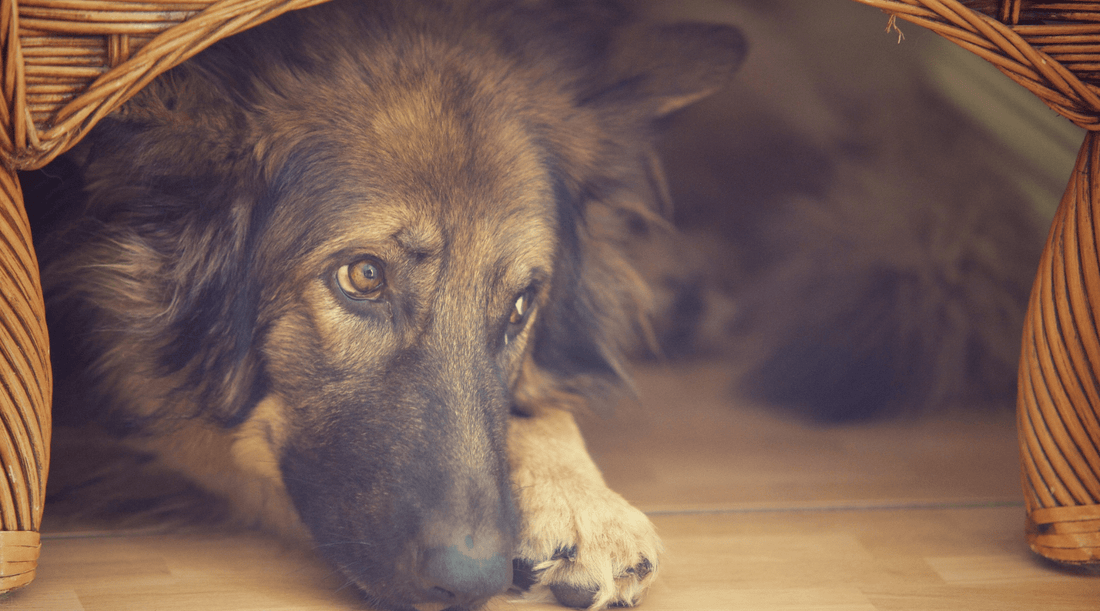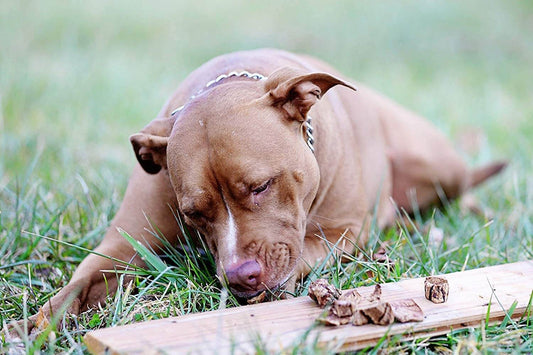
The Connection Between Dog Stress and Digestive Health: The Brain-Gut Axis
Dawn Miller Jan 22, 20255 Minute ReadDog stress and digestive health are inextricably linked. When a dog feels stressed, it diverts resources from digestion to manage a threat—real, imagined, or somewhere in between. And that can have uncomfortable —and sometimes messy—results.
The other day, I was at the vet for my lab mix Bruno's annual. Going to the vet has never been Bruno's idea of a perfect outing. He likes his vet. But he also knows there will inevitably be discomfort, prodding, and maybe needles.
I can see his dog stress symptoms rise as we pull into the parking lot. Unlike his usual enjoyment of a good car ride, vet car rides look like pure terror. So, I've had to learn some tricks over the years to reduce dog anxiety levels and stop digestive upset.
Calming dog treats and a good dog bone are certainly part of the equation.
Dog Stress and Digestive Health: What’s the Connection?
Just like humans, dogs have a gut-brain axis. It connects the brain (hormones, emotions, immunity, etc.) and the digestive system.
When the dog feels stress, they release cortisol (the stress hormone). It activates a series of body responses. This elevates the pulse, raises high blood pressure, and causes an energy diversion from rest and digest functions to the dog's running muscles.
It's a beautifully intricate process that helps my dogs' ancestral wolves fight or escape a threat to survive. But to send resources where they're needed immediately, the dog must stop digesting food.
This causes digestive symptoms we associate with stress like:
- Upset stomach
- Vomiting
- Diarrhea
- Constipation
- Cramping
- Inflammatory bowels
- Disruption to the gut microbiome
What's more, chronic dog stress can turn this into a regular thing. If a dog stays in a heightened state of stress, they may not digest food well and could become malnourished.
Sadly, this can become a vicious cycle for a dog as the gut microbiome is critical to supporting our mood and sense of well-being.
In humans, 95% of the body's serotonin (the happiness hormone) is produced in the gut by the critters that live there. So, if the gut microbiome is damaged, even the littlest stressor feels more stressful. I imagine it works similarly for dogs.
The Dog Stress Symptoms I Watch for
Some signs of stress are more obvious than others and will fall into these general categories.
- Digestive Symptoms. Diarrhea, constipation, vomiting, or loss of appetite.
- Behavior Changes. Pacing, hiding, excessive licking, or chewing (including destructive chewing).
- Physical Symptoms. Trembling, drooling, or excessive shedding.
- Vocalization. Whining, barking, or howling more than usual.
- Activity Level Changes. Less interested in playing, running, walks, playdates, etc.
Can Stress Cause Diarrhea in Dogs?
It certainly can! The mind has a tremendous impact on physical symptoms.
Science is only beginning to understand this connection. When stress hits, it disrupts whatever the dog's body was up to before.
This leads to loose stools. What we call symptoms is the body’s way of saying, “I’m not okay.”
I learned the hard way that ignoring stress-related diarrhea can lead to dehydration and nutrient loss. Bruno wasn't doing well for a while there.
Now, when Bruno shows signs of stress-induced digestive issues, I take a different approach. I make sure to hydrate him with small, frequent sips of water and watered kibble. I also make sure he's getting the nutrition his body needs to thrive.
How to Reduce Stress in Dogs?
I can't take every stressor out of his life. But I can support mental health and overall physical dog health. These are critical for dogs and humans to manage stress effectively.
1. Support Mental Health
I support his mental health by providing a mentally stimulating environment. It includes physical activities like going for walks, playing fetch, and practicing "dog tricks". These help him feel a sense of well-being through the fullness of life.
I also like to get the dogs dog puzzle toys that make them figure out how to get to the food. Instead of buying ones that are made of plastic, I give them nature's dog puzzle.
Grass-fed beef marrow bones contain naturally occurring bone marrow. Dogs chew, lick, and turn the bone, trying to get it out. It's very mentally stimulating to them and feeds their instinct to chew.
2. Support Physical Health
Of course, a lot of the stuff that supports mental health also supports physical health. So, I'll focus on nutrition. I can enhance Bruno's nutrition by supplementing a high all-kibble diet with healthy dog treats and chews.
These are single-ingredient dog bones and treats from grass-fed cattle born and raised in the US. Marrow bones from grass-fed cattle are high in collagen protein, healthy fats, and vitamins that a dog may lack if they eat an all-kibble diet, even with an excellent science-backed food.
3. Create a Dog Sanctuary
Dogs thrive on routine and predictability. If you know a stressor is coming (like visitors, fireworks, or travel), try to prepare by creating a quiet, safe space for your dog.
- Dim the lights, play calming music, and offer a favorite chew or blanket.
- Avoid overwhelming your dog with too much noise or activity.
Bruno has a rug where he likes to go when he wants some me time or needs to get away. My terrier Pixie prefers her crate, piled high with dog blankets. We call it "Pixie's Den".
4. Use Calming Dog Treats
You might expect me to suggest dog treats with valerian root, chamomile or lavender. However, the best calming dog treats help alleviate boredom and mentally stimulate them. When a dog feels mentally stimulated, they can better manage stress.
I often give the dogs their healthy dog chews before a stressful event. These are great because a 20-minute dog bone chew session doesn't give a whole lot to digest. They only get a little marrow out each time.
But that time spent giving into their natural instinct to chew completely changes how Bruno reacts to a stressful situation.
5. Incorporate Digestive Friendly Foods
Certain foods are known for their anti-inflammatory properties. These can ease digestion and reduce symptoms. For example, butternut squash, pumpkin, berries, and apples have Quercetin, an antioxidant that calms the digestive tract.
Foods with the healthy, fat omega 3, can also support digestion by reducing inflammatory responses in stressed tummies. Bone marrow from grass-fed beef cattle is especially high in omega 3.
I like to refill marrow bones after the bone marrow is gone with tasty dog-okay treats like these to support digestive health.
6. Build Trust with Training
Training your dog to follow commands builds trust and helps them learn what to expect at the vet, home, neighbor's house, or park.
Because they come when you call, sit, stay, go to crate, etc., you experience less frustration around dog behaviors. In instances where you need them to do something, both of you are generally calmer.
They learn to trust and follow your lead. They begin to understand that you will keep them safe. This can alleviate stress, especially in rescue dogs who may have often been betrayed before.
To learn more about building trust with dog training and high value treats, I invite you to take a look at this Free 7-Day Dog Training Challenge.
Available On:





